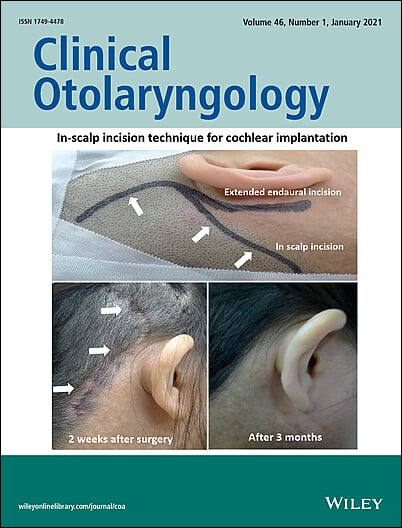Understand How Otorrinolaringologia Services Can Help with Allergies
Understand How Otorrinolaringologia Services Can Help with Allergies
Blog Article
Exploring the Field of Otolaryngology: What to Expect When You Seek Advice From an ENT
Otolaryngology, commonly described as ENT, incorporates the medical diagnosis and therapy of ear, throat, and nose conditions. For those experiencing associated concerns, consulting an ENT professional can provide clarity and relief. Understanding what to expect during such appointments is essential for effective communication and care. This summary will certainly describe crucial elements of the ENT experience, consisting of common reasons for gos to and the procedures entailed in medical diagnosis and treatment.

Comprehending Otolaryngology: A Review
Otolaryngology, usually described as ENT (Ear, throat, and nose) medication, is a specific branch of medicine that concentrates on the diagnosis and treatment of problems affecting these crucial locations of the human body. This field incorporates a variety of problems, including those pertaining to hearing, balance, breathing feature, and speech. Otolaryngologists are trained to handle both surgical and clinical treatments, using sophisticated techniques and technologies. Their knowledge expands past typical conditions, resolving problems such as allergic reactions, sinus infections, and hearing loss. In addition, they play a vital duty in the administration of head and neck cancers, supplying thorough care tailored to specific patient requirements. On the whole, otolaryngology remains essential for maintaining health and wellness and lifestyle in damaged people.
Usual Factors to See an ENT Professional
Numerous people seek the knowledge of an ENT professional for a variety of reasons, mirroring the diverse nature of conditions that influence the throat, nose, and ear. Typical concerns include chronic sinus problems, which typically leads to relentless nasal congestion and face discomfort. Allergies and their associated signs, such as itching and sneezing, likewise motivate sees to these specialists (ENT). Hearing loss, whether abrupt or progressive, is an additional significant reason for examination. Furthermore, people might look for evaluation for throat conditions, consisting of relentless hoarseness or ingesting troubles. Sleep apnea, defined by cut off breathing throughout sleep, is regularly resolved by ENT professionals. Each of these conditions highlights the relevance of specialized care in managing intricate ENT-related wellness issues
Preparing for Your ENT Consultation
When preparing for an ENT appointment, it is vital to gather pertinent info and consider any kind of details worries. Clients ought to assemble a detailed case history, including previous ear, nose, or throat concerns, surgical treatments, and current drugs. Recording symptoms-- such as duration, frequency, and intensity-- can give valuable insights for the ENT professional. Additionally, people should prepare a listing of inquiries they wish to ask, making sure that all concerns are attended to throughout the see. Bringing along any appropriate clinical documents or test outcomes can further help the ENT in recognizing the client's problem. Ultimately, clients should validate their appointment details, consisting of location, time, and date, to decrease any last-minute complication. Proper preparation can enhance the efficiency of the consultation and lead to better outcomes.
What to Anticipate Throughout the Appointment
As the consultation starts, the person can anticipate to participate in a thorough conversation with the ENT professional regarding their signs and medical background. The professional will ask about the period, regularity, and seriousness of signs such as hearing loss, nasal congestion, or aching throat. Furthermore, the client's previous medical conditions, drugs, and any type of appropriate family history will be reviewed, aiding the professional in creating a total understanding of the individual's health and wellness. The ENT may additionally inquire about way of living factors, such as exposure to irritants or toxic irritants. This open dialogue develops a foundation for the assessment, ensuring that the person's concerns are attended to and setting the phase for any type of essential analyses or recommendations for therapy.
Diagnostic Examinations and Treatments in Otolaryngology
A series of diagnostic tests and treatments are important in otolaryngology to accurately examine and diagnose problems impacting the nose, throat, and ear. Common examinations consist of audiometry, which measures hearing feature, and tympanometry, evaluating center ear pressure. Nasal endoscopy allows visualization of the nasal flows and sinuses, while laryngoscopy examines the throat and singing cords. Imaging methods, such as CT scans and MRIs, provide in-depth sights of head and neck structures. Allergic reaction testing might also be performed to identify triggers for sinus or breathing issues. These analysis tools make it possible for ENT specialists to develop a detailed understanding of people' conditions, guaranteeing customized and reliable monitoring strategies. Correct diagnosis is essential for successful treatment results in otolaryngology.
Therapy Options Offered by ENT Specialists
ENT experts use a selection of therapy alternatives tailored to deal with certain problems influencing the ear, throat, and nose. These treatments range from traditional techniques, such as drug and way of living adjustments, to more intrusive treatments. For example, allergic reactions might be handled with antihistamines or immunotherapy, while chronic sinusitis might require nasal corticosteroids or sinus surgical treatment. For hearing loss, ENT professionals often advise listening device or surgical interventions like cochlear implants. In instances of throat problems, choices can include speech treatment or surgeries to remove obstructions. In addition, they may give advice for taking care of sleep apnea, including making use of Get More Info CPAP gadgets or surgical treatments. On the whole, the goal is to enhance people' lifestyle with personalized treatment and efficient treatment strategies.
When to Look For Follow-Up Care With an ENT
Acknowledging when to look for follow-up care with an ENT specialist is essential for handling ongoing signs and symptoms or difficulties connected to ear, throat, and nose problems. Patients must think about arranging a follow-up visit if symptoms linger regardless of first treatment, such as persistent ear discomfort, nasal blockage, or throat discomfort. Adjustments in hearing, equilibrium issues, or unusual nasal discharge might additionally necessitate further examination. Furthermore, if a person experiences side results from prescribed medicines or has actually undertaken a surgery, follow-up care is very important to monitor recuperation and attend to any kind of concerns. Timely appointments can guarantee effective administration of problems, stop possible problems, and supply satisfaction concerning one's wellness. Looking for follow-up care promotes positive health and wellness monitoring in otolaryngology.
Often Asked Questions

What Certifications Should I Try to find in an ENT Professional?
When looking for an ENT professional, our website one ought to look for board accreditation, relevant experience, and solid patient evaluations. Additionally, efficient interaction skills and a thoughtful technique can significantly boost the overall therapy experience.
How Do I Pick the Right ENT for My Needs?
Choosing the appropriate ENT specialist involves assessing their certifications, experience, and individual reviews (Sinus). It is necessary to ponder their communication design and method to treatment, ensuring they line up with the person's details health requirements and choices
Are There Any Dangers Linked With ENT Procedures?
The risks connected with ENT procedures may include best cheap hearing aid infection, bleeding, anesthesia difficulties, and potential damage to surrounding structures. Individuals need to discuss these dangers with their medical professional to recognize individual issues and assurance educated decisions.
Exactly How Can I Take Care Of Anxiety Prior To My ENT Consultation?
To take care of anxiety before an appointment, individuals can exercise deep breathing workouts, envision favorable outcomes, prepare questions ahead of time, and seek assistance from pals or family members, fostering a sense of reassurance and peace.
What Should I Do if I Experience Adverse Effects From Treatment?
If adverse effects from therapy happen, the individual should promptly report them to their medical care service provider. Modifications to treatment or added interventions might be essential to ensure safety and performance in handling their condition - ENT surgery. As the appointment starts, the individual can anticipate to engage in an extensive conversation with the ENT expert about their symptoms and medical history. These analysis devices allow ENT experts to develop a comprehensive understanding of patients' problems, ensuring customized and effective monitoring plans. ENT professionals use a range of therapy alternatives tailored to address certain problems impacting the throat, ear, and nose. When looking for an ENT specialist, one need to look for board accreditation, relevant experience, and solid patient testimonials. Choosing the right ENT specialist includes examining their qualifications, experience, and patient evaluations
Report this page